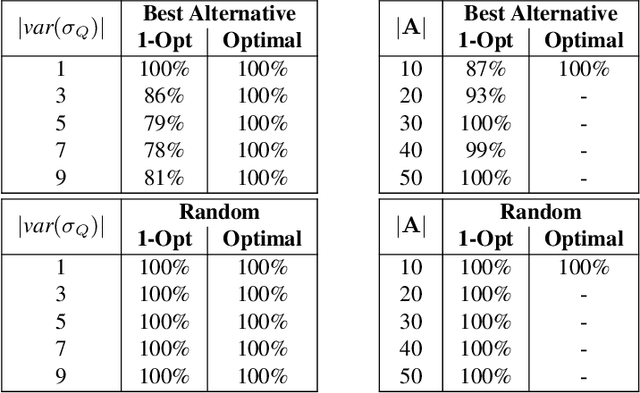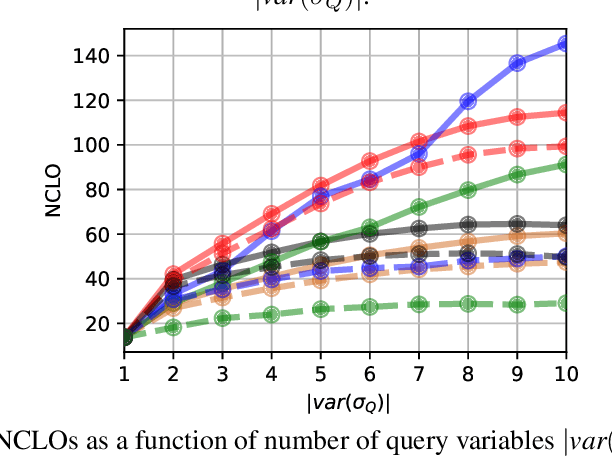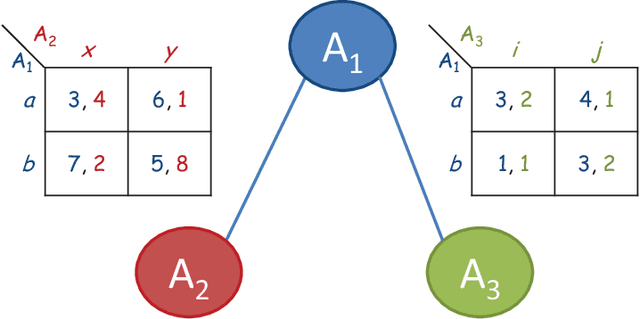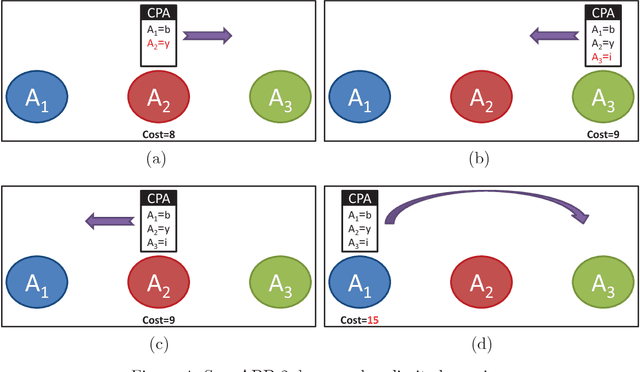Roie Zivan
Explainable Distributed Constraint Optimization Problems
Feb 19, 2025



Abstract:The Distributed Constraint Optimization Problem (DCOP) formulation is a powerful tool to model cooperative multi-agent problems that need to be solved distributively. A core assumption of existing approaches is that DCOP solutions can be easily understood, accepted, and adopted, which may not hold, as evidenced by the large body of literature on Explainable AI. In this paper, we propose the Explainable DCOP (X-DCOP) model, which extends a DCOP to include its solution and a contrastive query for that solution. We formally define some key properties that contrastive explanations must satisfy for them to be considered as valid solutions to X-DCOPs as well as theoretical results on the existence of such valid explanations. To solve X-DCOPs, we propose a distributed framework as well as several optimizations and suboptimal variants to find valid explanations. We also include a human user study that showed that users, not surprisingly, prefer shorter explanations over longer ones. Our empirical evaluations showed that our approach can scale to large problems, and the different variants provide different options for trading off explanation lengths for smaller runtimes. Thus, our model and algorithmic contributions extend the state of the art by reducing the barrier for users to understand DCOP solutions, facilitating their adoption in more real-world applications.
Solving DCOPs with Distributed Large Neighborhood Search
Feb 23, 2017



Abstract:The field of Distributed Constraint Optimization has gained momentum in recent years, thanks to its ability to address various applications related to multi-agent cooperation. Nevertheless, solving Distributed Constraint Optimization Problems (DCOPs) optimally is NP-hard. Therefore, in large-scale, complex applications, incomplete DCOP algorithms are necessary. Current incomplete DCOP algorithms suffer of one or more of the following limitations: they (a) find local minima without providing quality guarantees; (b) provide loose quality assessment; or (c) are unable to benefit from the structure of the problem, such as domain-dependent knowledge and hard constraints. Therefore, capitalizing on strategies from the centralized constraint solving community, we propose a Distributed Large Neighborhood Search (D-LNS) framework to solve DCOPs. The proposed framework (with its novel repair phase) provides guarantees on solution quality, refining upper and lower bounds during the iterative process, and can exploit domain-dependent structures. Our experimental results show that D-LNS outperforms other incomplete DCOP algorithms on both structured and unstructured problem instances.
Asymmetric Distributed Constraint Optimization Problems
Feb 04, 2014



Abstract:Distributed Constraint Optimization (DCOP) is a powerful framework for representing and solving distributed combinatorial problems, where the variables of the problem are owned by different agents. Many multi-agent problems include constraints that produce different gains (or costs) for the participating agents. Asymmetric gains of constrained agents cannot be naturally represented by the standard DCOP model. The present paper proposes a general framework for Asymmetric DCOPs (ADCOPs). In ADCOPs different agents may have different valuations for constraints that they are involved in. The new framework bridges the gap between multi-agent problems which tend to have asymmetric structure and the standard symmetric DCOP model. The benefits of the proposed model over previous attempts to generalize the DCOP model are discussed and evaluated. Innovative algorithms that apply to the special properties of the proposed ADCOP model are presented in detail. These include complete algorithms that have a substantial advantage in terms of runtime and network load over existing algorithms (for standard DCOPs) which use alternative representations. Moreover, standard incomplete algorithms (i.e., local search algorithms) are inapplicable to the existing DCOP representations of asymmetric constraints and when they are applied to the new ADCOP framework they often fail to converge to a local optimum and yield poor results. The local search algorithms proposed in the present paper converge to high quality solutions. The experimental evidence that is presented reveals that the proposed local search algorithms for ADCOPs achieve high quality solutions while preserving a high level of privacy.
Asynchronous Forward Bounding for Distributed COPs
Jan 15, 2014



Abstract:A new search algorithm for solving distributed constraint optimization problems (DisCOPs) is presented. Agents assign variables sequentially and compute bounds on partial assignments asynchronously. The asynchronous bounds computation is based on the propagation of partial assignments. The asynchronous forward-bounding algorithm (AFB) is a distributed optimization search algorithm that keeps one consistent partial assignment at all times. The algorithm is described in detail and its correctness proven. Experimental evaluation shows that AFB outperforms synchronous branch and bound by many orders of magnitude, and produces a phase transition as the tightness of the problem increases. This is an analogous effect to the phase transition that has been observed when local consistency maintenance is applied to MaxCSPs. The AFB algorithm is further enhanced by the addition of a backjumping mechanism, resulting in the AFB-BJ algorithm. Distributed backjumping is based on accumulated information on bounds of all values and on processing concurrently a queue of candidate goals for the next move back. The AFB-BJ algorithm is compared experimentally to other DisCOP algorithms (ADOPT, DPOP, OptAPO) and is shown to be a very efficient algorithm for DisCOPs.
 Add to Chrome
Add to Chrome Add to Firefox
Add to Firefox Add to Edge
Add to Edge